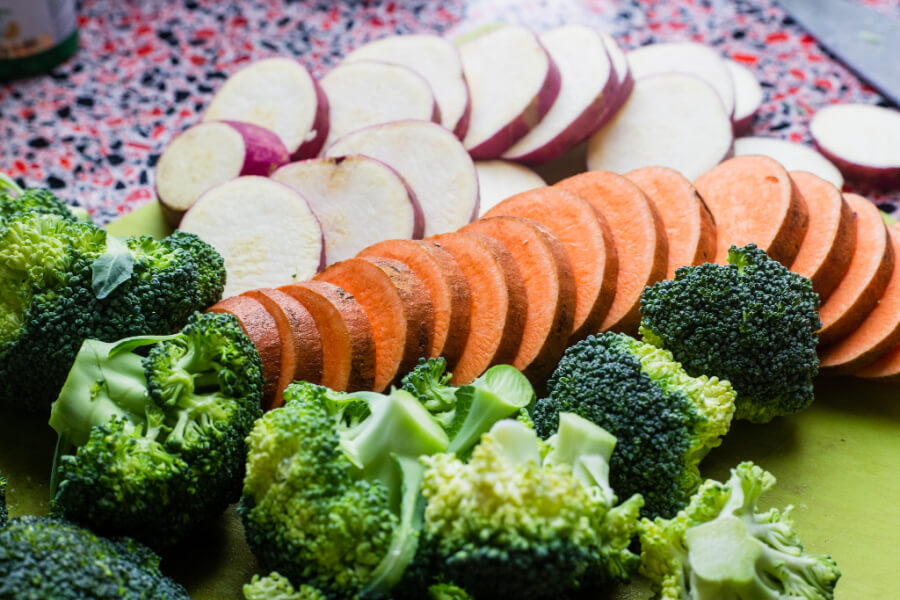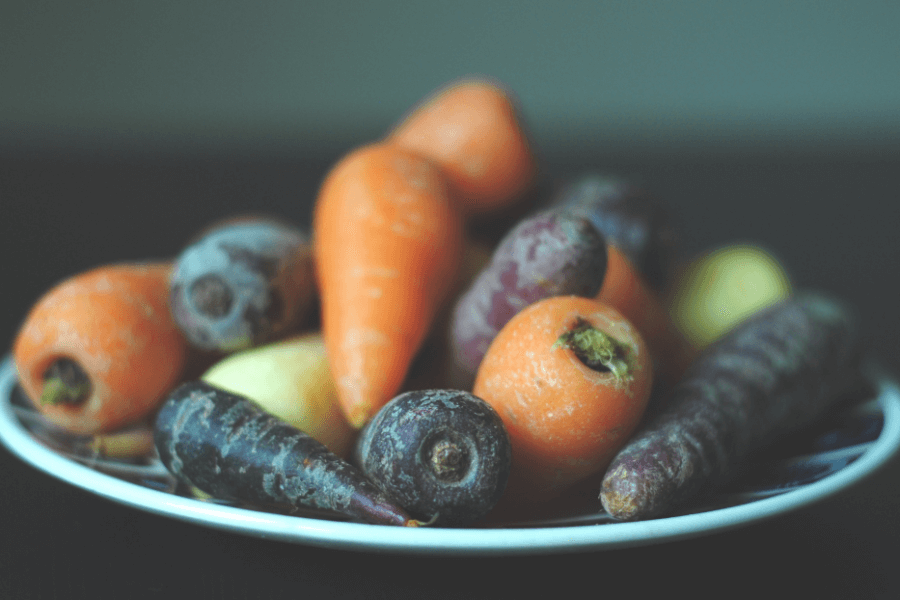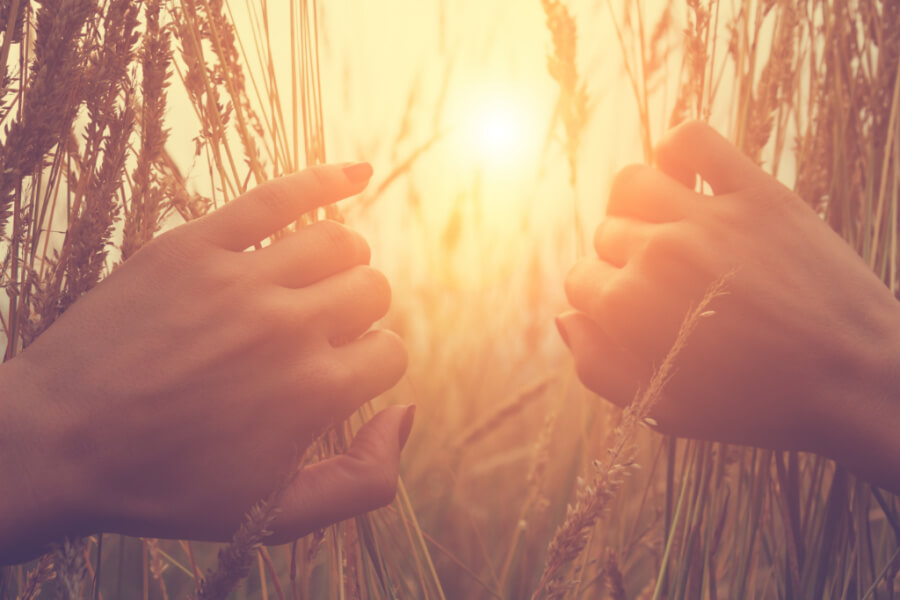I remember when organic first became a buzzword and talks of GMOs (Genetically Modified Organisms) were brand new and treated both as a farmer’s dream and the answer to many agricultural issues, but also demonised in the media. Will it change my DNA? Will we be permanently affected? What testing has happened to justify these foods and are they safe? Writing this in the times of Covid vaccines being developed, a lot of these questions seem very familiar.
And what about your health, periods and fertility? What’s the impact there? Do you need to buy organic?
These are great questions, there are some answers that we can find, and there are others that are more thought exercises, but let’s take a look.
What Is The Problem With Pesticides & Herbicides?
Pesticides and herbicides are used in modern agriculture to make farming more economical and efficient. Farmers are not paid a lot and here in the UK, there have been farming strikes due to gross underpayment across a number of different agricultural industries.
There are many many issues globally with modern farming which I can’t touch on here for length and also lack of expertise.
Farmers don’t want to pay for resources such as fertilisers, and seeds only to lose some of that crop to pests such as insects so they need to use insecticides or pesticides.
Then there are also weeds, aka unwanted plants, that grow within these crops that will compete for the same nutrients, sunlight and other resources as well as dilute the quality of the crop, meaning that the farmer has to either remove all the unwanted weeds before selling the harvest or charge less as the next person in the chain will have to remove the unwanted plants, some of which could even be harmful for human health if cross contaminated.
There are also various moulds as well which need to be killed off before they decimate the whole crop.
These chemicals collectively are usually called pesticides, insecticides and herbicides. They are effectively the effective dosage of poisons for the species they are designed to kill. They are also used in our homes to protect us from infestations that can cause damage such as from termites.

But what about their effect on humans? This is where it gets complex and nuanced. Many main stream news documentaries will say that the amount that gets into our bodies is almost negligible, maybe a few drops in the equivalent of a swimming so very diluted. And they will also point out that our livers are great detoxifiers, which is true.
But at what point does this become a critical dose? Who has tested the dosage? What if your liver is impaired and it is already struggling with other health issues, hormones or medications or the other approximately 250 (rounded down) toxicants (man made chemicals) in our bodies?
How much is in each piece of produce and how much produce would you need to eat for it to have an effect? What about the half life and time it takes for your body to process? What about if you are eating a lot of produce because you eat plenty of plant based foods every day, is there a cumulative effect?
Also, if these are effective doses for small organisms, what about our own internal small microorganisms, the microbiota in our gut (also in other places like our skin)?
There has already been links of glyphosate with serious diseases such as cancer, especially to those who are spraying it (and receiving it in much higher doses than we would whilst eating food with trace amounts), to the extent that Bayer were successfully sued to the tune of £10,9bn.
What about those who live in areas where this is sprayed or who may be using glyphosate in their gardens? And, bearing in mind that a study showed that newborns are born with an average of 200 toxicants in their cord blood, some of which are suspected to be pesticides and herbicides), what impact can it have on your hormones, inflammation and foetal development?

What’s a GMO?
Before we more on to whether or not pesticides are harmful, one other term we hear thrown around with pesticides, insecticides, herbicides and organic foods, is GMOs.
This refers to Genetically Modified Organisms. There are a number of ways in which organisms can be modified. I have heard a number of weird and wonderful experiments such as using the gene in certain jellyfish that fluoresce when they are hungry to get crops to do the same so that that fertilisers are used where they are needed.
Equally, they are used in other ways such as making the crops more resistant to certain herbicides and other chemicals so that they are less affected by herbicides and therefore more can be used if necessary to get rid of the other unwanted plants.
There can also be crops produced that produce their own insecticides (do this, often with their essential oils but GMOs increase that amount and can even give that ability to plants that don’t have it yet on their own through evolution).
So, as you can see, the case with GMOs isn’t quite so black and white, some increase our usage of chemicals that are being released into the environment, however, some are reducing them. One thing that is worth bearing in mind, is that the seeds that these crops produce may be able to cross pollinate with other plants in the environment, so once the first GMO crops were introduced, it is difficult to contain the effect to one area, so finding out whether these characteristics have spread is an almost impossible task.
Furthermore, if you eat meat, then this moves up the food chain into meat products and dairy.
Science can be brilliant, but to quote the great Dr Ian Malcolm in the original Jurassic Park movie (portrayed by the magnificent Jeff Goldblum), “Scientists Were So Preoccupied With Whether Or Not They Could, They Didn’t Stop To Think If They Should”.

So Should I Be Worried?
Before we go further, I just want to say a few things. It is really easy to get scared and worried about this, and I urge you to apply discretion, and caution before getting carried away. I know many health and wellness blogs are into scare stories of big industries, but I want to offer a more realistic view that is balanced.
Some of the stats above can be disturbing, but it is worth noting that just like some naturally found substances such as certain mushrooms or poisonous plants are not safe just because they are natural, not all man made chemicals are harmful, just because they are in us.
In some cases they may be helpful and in some cases whether they are helpful or harmful and how effective they are on someone is highly personal.
Also, it can be easy to let panic overwhelm you at times and go through what has been dubbed “detoxorexia”, a term I don’t particularly like, but one that most people understand, someone who is so consumed by whether chemicals around them are harmful it is preventing them from living their life and causing mental harm.
We have many things that are helpful and harmful in our lives. Cutting out exposure to a few big things, can controlling a few things that are in your power to control, rather than worrying about things you can’t, can have a big benefit to your health and wellbeing.

Potential Issues With Periods
1. Oestrogen Metabolism
Oestrogen is the chemical that is instrumental in the first half of the menstrual cycle, produced in our ovaries and responsible for over 300 processes in our bodies. You need it to develop a womb lining (endometrium), fertile cervical fluid, produce progesterone receptors it’s responsible for great skin, natural lubrication, increasing libido (along with testosterone) and having you feel great around ovulation.
Not enough and you feel dry “down there”, tired and cranky. Too much of it in relation to progesterone in the second half of the cycle and you can find yourself suffering from sore or painful breasts, bloating, mood issues, PMS and heavy periods potentially with spotting before hand.
We also need to be ovulating regularly to get many of the benefits of our hormone cycle such as optimum bone heath, breast health and heart health. So how do we ensure that we are getting enough oestrogen? Well, first of all we need to be ovulating regularly, and unfortunately, there are studies that show that women exposed to pesticides have longer cycles, but I would caution that these women were living on farms and being exposed directly. So we can extrapolate that pesticides do have an effect, but how much from ingesting them in our food, is more uncertain.
We also need to use and lose our oestrogen and to do that, our liver needs to be working efficiently and optimally. We don’t know what the critical dosage of foods with chemicals and which chemicals are going to cause the liver to struggle to keep up with the demand.
Also, the liver is also detoxifying any alcohol, medications and other toxicants in our bodies as well as doing its day job of dealing with our regular hormones, so the tipping point is likely to be different for all of us.
The good news is that you can help support your liver with plenty of micronutrients found in dark green leafy vegetables and nutrients found in vegetables, fruits, nuts and seeds. Unfortunately, these are the foods that can be most affected by man made chemicals as they are sprayed during their growth stages.
Finally, we have the estrobalome, the bacteria in our gut that are particularly associated with oestrogen metabolism and we just don’t know the effect of various chemicals on this delicate ecosystem in our gut.

2. Progesterone & The Thyroid
We discussed briefly above the effects of progesterone that is too low in comparison to oestrogen, but it is also needed to hold the endometrium in place, is the body’s natural calming hormone and it up regulates the thyroid in the second half of the cycle to increase our body temperature incase we are pregnant, to act as an incubator for a potentially fertilised foetus.
The thyroid produces hormones that give us energy, help our mood and also helps with progesterone production, and there is some evidence that thyroid tissue can be damaged by pesticides.
3. Insulin, PCOS & Androgens
One big problem that can affect our periods is high androgens (I usually simplify to high testosterone). This can be caused by a few things such as the pill but the main cause for many people is insulin dis-regulation.
Too much insulin in response to an increase in blood sugar can cause the ovaries to produce testosterone instead of oestrogen and then you get signs of acne, hirsutism (facial hair), female pattern baldness, fat around the middle and excess body hair, as well as irregular and unpredictable period and sub-fertility/infertility.
There is some evidence that persistent organic pollutants can contribute to obesity, insulin resistance, pre-diabetes and diabetes.

4. Hormones In General
Hormones are a key part of the menstrual cycle. They are messengers that are carried in the blood to the receptor sites that then instruct the cell what to do. A study showed that glyphosate can have many effects on hormones such as:
- Alter hormone distribution of circulating levels of hormones
- Induce alterations in hormone metabolism or clearance
- Alter the fate of hormone-producing or hormone-responsive cells
- Alter hormone receptor expression
- Antagonize hormone receptors
- Interact with or activate hormone receptors
- Alter signal transduction in hormone-responsive cells
- Induce epigenetic modifications in hormone-producing or hormone-responsive cells
- Alter hormone synthesis
- Alter hormone transport across cell membranes
Again, what level of exposure could cause these effects is unknown.
Other Studies That May Be Of Interest
There is a study that looks at pesticides and the effects on female and male fertility. A study showing the pesticide residues in fruit and vegetables in relation to semen quality in men, a similar study showing the effects on pregnancy outcomes on women undergoing fertility treatment.
Studies on these chemicals and fertility in general mostly animal models, but this white paper is a good primer for understanding some general risks including potential breast cancer risks.
The studies on pesticide exposure in the womb on developing foetuses is not entirely clear, so I didn’t want to include anything here, as it can be alarming to read but we know that pesticides exposure can be problematic for infants and young children.

Do Pesticides Affect Periods?
Well, I think we can see that pesticides have an effect on the menstrual cycle, hormones and fertility, however, how much of an effect when ingested is not clear and the dosage isn’t clear.
Further more, it would be interesting to know the effect of cooking and heat on these chemicals too (it might make things better or worse).
However, as someone who is a big supporter of becoming your own health detective, I recommend you start charting your period and symptoms and see if pesticide/herbicide reduction improves your overall health, wellbeing, periods and if relevant, your fertility.
What You Can Do?
First of all, if you are working in an industry where you are spraying or are exposed to environmental spraying, then what can you do to minimise that? Personal Protective Equipment and coverings and really good hygiene afterwards are a great start.
But let’s get onto the big one, organic foods. This causes such a commotion. If you can afford organic foods, especially from farmers markets or directly from farmers, great.
However, I do recognise that this is a rather privileged position to be in so there are some other things you can do:
- If you can afford to buy some organic foods, then check out the Clean 15 and Dirty Dozen. These are lists compiled of the least and most contaminated foods by the Environmental Working Group (EWG) that gets updated each year. You can buy non organic versions of just the clean 15 or anything not mentioned in the dirty dozen. If you eat meat and dairy, I would focus on getting organic versions of these products as much as possible. Also bear in mind soy and other meat substitutes can be contaminated.
- Soak and wash your produce well before using. Washing and scrubbing all plant based food for at least 30 seconds is a good start. You can also soak them for a little while and even use veggie soap. This will help reduce the amount of pesticides on the outside and upper layers. Please note that you should also wash produce which have skins you don’t eat. A few years ago there have been cases of watermelon e-coli and salmonella that was on the outside of the melon and the inside was contaminated by the knife cutting through. So it’s always good to give your food a good wash, clean and soak before preparing whenever possible. Obviously this isn’t going to work on meat based products.
- Peal your produce. This one saddens me as often, the skin contains the most nutrient dense part of the fruit, and a higher fibre content, but if your food is likely to be contaminated and you feel that you are sensitive to chemicals, then this could be an option for you.
- Get to know your food chain. I know in the US there are co-operatives such as CSAs where you can buy into a group of farmer’s produce for a season and this is an excellent way to get to know what you are eating, how it is treated and if it includes meat, what the cattle is fed on and the conditions in which they live.
A super important point I want to make is that you still need plant based food in your diet. Yes there is a risk it can be contaminated and yes this may have an affect on you, however, there are still likely to be many nutrients in that food which can help to offset these pollutants by helping out the liver.
So if you are struggling with this, you can stick to washing and soaking your food where possible and know that you are doing your best.

What About Meat?
This is something I couldn’t find much data, so I think it’s safe to say, as most animals are not washing their food, and not getting a choice in what they eat, but there are studies that show pesticide residue in meat . There is also evidence of residues in dairy, so being aware of this in your buying patterns is important.
Are Pesticides a Period Problem For You?
I’ll let you decide. I think the key things to bear in mind is you can only do your best. If you can access organic fruit and veg within your means, then please go for it. However, if you are limited in resources, then ensuring you give your food a good soak and rinse could be greatly beneficial too.
There is certainly plenty of evidence it is harming people in the agricultural industry and this is a massive global issue that I hope the legal case against Bayer (Monsanto) helps to bring changes moving forward.
If you want to know more about your period problems and learn more about the hormonal issues I mentioned above, take the period quiz to get your quiz download and access to videos on how you can fix your period problems.




